从句易混易错题
- 格式:docx
- 大小:11.21 KB
- 文档页数:2
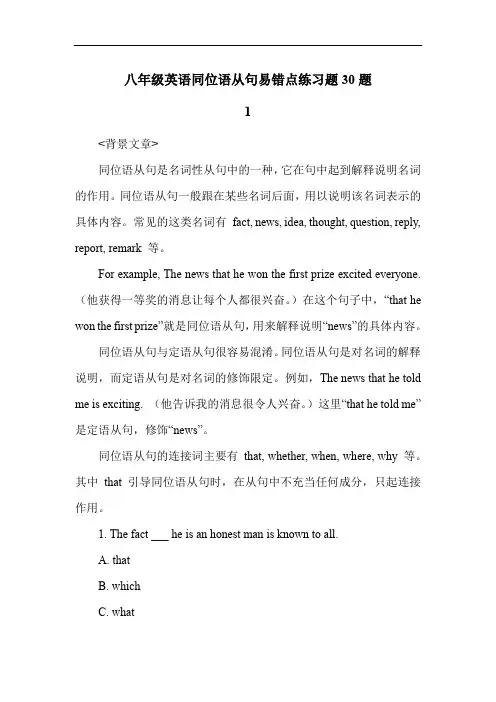
八年级英语同位语从句易错点练习题30题1<背景文章>同位语从句是名词性从句中的一种,它在句中起到解释说明名词的作用。
同位语从句一般跟在某些名词后面,用以说明该名词表示的具体内容。
常见的这类名词有fact, news, idea, thought, question, reply, report, remark 等。
For example, The news that he won the first prize excited everyone. (他获得一等奖的消息让每个人都很兴奋。
)在这个句子中,“that he won the first prize”就是同位语从句,用来解释说明“news”的具体内容。
同位语从句与定语从句很容易混淆。
同位语从句是对名词的解释说明,而定语从句是对名词的修饰限定。
例如,The news that he told me is exciting. (他告诉我的消息很令人兴奋。
)这里“that he told me”是定语从句,修饰“news”。
同位语从句的连接词主要有that, whether, when, where, why 等。
其中that 引导同位语从句时,在从句中不充当任何成分,只起连接作用。
1. The fact ___ he is an honest man is known to all.A. thatB. whichC. what答案:A。
解析:“he is an honest man”是对“fact”的解释说明,且that 在同位语从句中不充当任何成分,只起连接作用。
2. The news ___ there will be a football match tomorrow is exciting.A. thatB. whichC. whatD. who答案:A。
解析:“there will be a football match tomorrow”是对“news”的解释说明,用that 引导同位语从句。
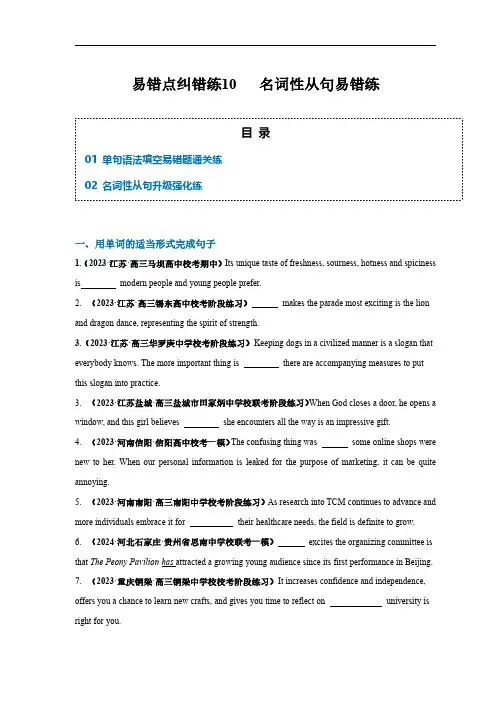
易错点纠错练10名词性从句易错练目录01单句语法填空易错题通关练02名词性从句升级强化练一、用单词的适当形式完成句子4.(2023·河南信阳·信阳高中校考一模)The confusing thing was some online shops were new to her.When our personal information is leaked for the purpose of marketing,it can be quite annoying.12.(广东省广东省四校联考2023-2024学年高三试题)The study doesn’t note these plant-based alternatives carry similar health risks or not.13.(广东省佛山市南海区2023-2024学年高三测试题)It has rich cultural tourism resources as it is ___Mount Tai rises,the Yellow River flows into the sea,and Confucius was born.17.(湖南省衡阳市衡阳县2023-2024年高三试题)Cobb,for her party,started to ask conference organizers who invited her to speak she could do so remotely;about three-quarters of the time,they agreed.19.(湖南省益阳市南县第一中学2023-2024学年高三试题)For example,Mary-Jo Saunders is learning a Chinese poem today.is special is that she is able to recite it without an accent.20.(湖南天壹名校联盟2023-2024学年高三大联考试题)She noted that cultural integration has always been a proposition(主张)of the Maltese government,and_____cooperation between the two sides should be based on equality and mutual benefit in order to be sustainable.22.(湖北省腾云联盟2023-2024年高三联考试题)Phrases like“replace weapons of war with gifts of jade and silk”and“gentle as jade”perfectly show jade symbolizes in the minds of Chinese people.23.(湖北省宜荆荆恩2023-2024学年高三起点试题)Its unique taste of freshness,sourness,hotness and spiciness is modern people and young people prefer.(江苏省镇江第一中学25.(江苏省2023-2024学年高三学情调研试题)We should trust life and trust our own abilities to understand is right and wrong,what decision to make and how to solve problems.26.(江苏省百校联考2023-2024学年高三试题)“It proves to me the cause I’ve enga ged in is world-class and for all humanity,”Chen said.32.(江苏省苏州中学校2023-2024学年高三试题)This was typically Huang Quande, fisherman-turned-photo model,looked in his photos with tourists from China and abroad.34.(河北省部分重点高中2023-2024学年高三综测试题)excites the organizing committee is that the Peony Pavilion has attracted a growing young audience since its premiere in Beijing.37.(2024届福建省三明市等5地高三一模试题)These words of her give us a look into the heart of this amazing woman,and carried her through a life of hard choices.39.(2024届辽宁省本溪市高中高三一模试题)The fresh thin air,snow-covered mountains and graceful animals running on the plains are____we’re here-to observe Tibetan antelopes,which are being hunted,legally,for their valuable fur.二、升级强化练Passage1Passage2Passage3(2024·河北石家庄·贵州省思南中学校联考一模)阅读下面短文,在空白处填入1个适当的单词或括号内单词的正确形式。

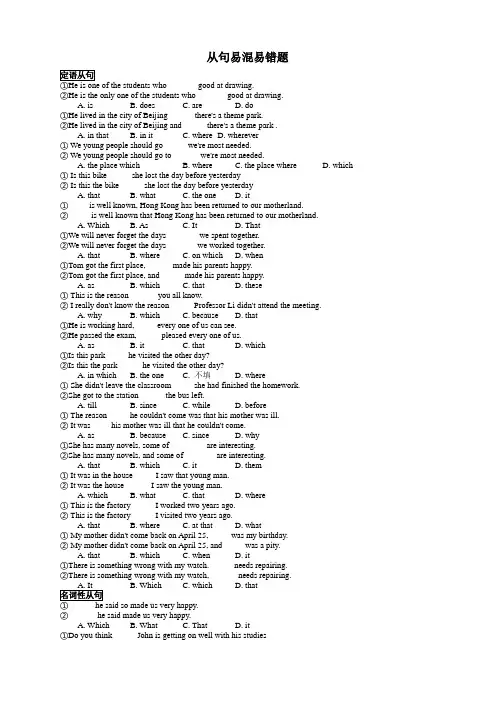
从句易混易错题②He is the only one of the students who_______ good at drawing.A. isB. doesC. areD. do①He lived in the city of Beijing ______there's a theme park.②He lived in the city of Beijing and _____ there's a theme park .A. in thatB. in itC. whereD. wherever① We young people should go _____ we're most needed.② We young people should go to ______ we're most needed.A. the place whichB. whereC. the place whereD. which① Is this bike _____ she lost the day before yesterday② Is this the bike _____ she lost the day before yesterdayA. thatB. whatC. the oneD. it①_____is well known, Hong Kong has been returned to our motherland.② _____is well known that Hong Kong has been returned to our motherland.A. WhichB. AsC. ItD. That①We will never forget the days _______ we spent together.②We will never forget the days _______we worked together.A. thatB. whereC. on whichD. when①Tom got the first place,______ made his parents happy.②Tom got the first place, and _____ made his parents happy.A. asB. whichC. thatD. these① This is the reason ______ you all know.② I really don't know the reason _____ Professor Li didn't attend the meeting.A. whyB. whichC. becauseD. that①He is working hard, _____every one of us can see.②He passed the exam, _____ pleased every one of us.A. asB. itC. thatD. which①Is this park _____he visited the other day?②Is this the park _____ he visited the other day?A. in whichB. the oneC. 不填D. where① She didn't leave the classroom _____she had finished the homework.②She got to the station ______the bus left.A. tillB. sinceC. whileD. before① The reason _____he couldn't come was that his mother was ill.② It was ____ his mother was ill that he couldn't come.A. asB. becauseC. sinceD. why①She has many novels, some of ________ are interesting.②She has many novels, and some of _______ are interesting.A. thatB. whichC. itD. them① It was in the house _____I saw that young man.② It was the house ______I saw the young man.A. whichB. whatC. thatD. where① This is the factory _____ I worked two years ago.② This is the factory _____ I visited two years ago.A. thatB. whereC. at thatD. what① My mother didn't come back on April 25, _____was my birthday.② My mother didn't come back on April 25, and _____was a pity.A. thatB. whichC. whenD. it①There is something wrong with my watch. _____ needs repairing.②There is something wrong with my watch, ______ needs repairing.B. WhichC. whichD. that② ______ he said made us very happy.A. WhichB. WhatC. ThatD. it①Do you think _____ John is getting on well with his studies② ______ do you think John is getting on with his studiesA. howB. whichC. whatD. that①They don't know _____ he will come unless told.②They don't know ______ he will come until told.A. thatB. whetherC. how longD. if or not①He asked us the question ______ the film was worth seeing.②He made the suggestion ______the meeting should be put off.A. whenB. whereC. thatD. whether① ______ studies hard will make greater progress.②_____will come to finish this task hasn't been decided yet.A. WhoB. WhoeverC. WhateverD. No matter who①I'm sure ______ he finished the task on time yesterday.②I'm not sure _____ he will finish the task on time.A. whetherB. whichC. ifD. that① ______he said at the meeting surprised us all.② _____ he said nothing at the meeting surprised us all.A. WhatB. WhichC. ThatD. Whether① ______ we'll have a meeting tomorrow has been decided.②______ we'll have a meeting tomorrow has not been decided.A. ThatB. IfC. WhetherD. what① Our teacher did ______ he could to help us.② Our teacher did all______ he could to help us.A. whatB. whichC. thatD. whom① Father promised _____I studied harder he would take me to Beijing next summer.② Father promised ____he would take me to Beijing next summer if I studied harder.A. thatB. ifC. that ifD. if that① _____ makes me feel sad seeing you living all alone.② ______ makes me feel sad is seeing you living all alone.A. ThatB. ThisC. ItD. What① _____Japan lies east of China is known to all.② I don't know ____ has happened to him now.B. whatC. thatD. where②There _____ no buses, so we had to walk home.A. isB. wereC. areD. being①Study hard ,______you'll succeed.②Study hard, _____ you'll fail.A. unlessB. orC. butD. and①She is ______ good a teacher that we all like her .②She is _____ good teacher that we all like her.A. soB. suchC. such aD. quite a①It is 3 years ______ his brother joined the army.②It is 3 years ago _____ his brother joined the army.③ It'll be 3 years _____ he comes backA. sinceB. thatC. afterD. before① It won't be long ______we meet again.② He came soon _____ we had watered the garden.A. tillB. sinceC. afterD. before①_____ hard it may be, I will carry it out.② _____ great progress I have made, there is still a long way to go.A. HowB. HoweverC. WhateverD. What① ____ , he could lift the heavy stone② _____, he could not lift the heavy stone.A. Strong as he wasB. So strong as was heC. He was strong enoughD. As he was strong① _____, we had to go home on foot yesterday.② _____, so we had to go home on foot yesterday.A. There being no busesB. Because there being no busesC. There were no busesD. Without any buses① ____ he come, what ____ you say to him ② _____ he comes, what _____ you say to himA. Should…wouldB. When…wouldC. If…willD. Were to…do。
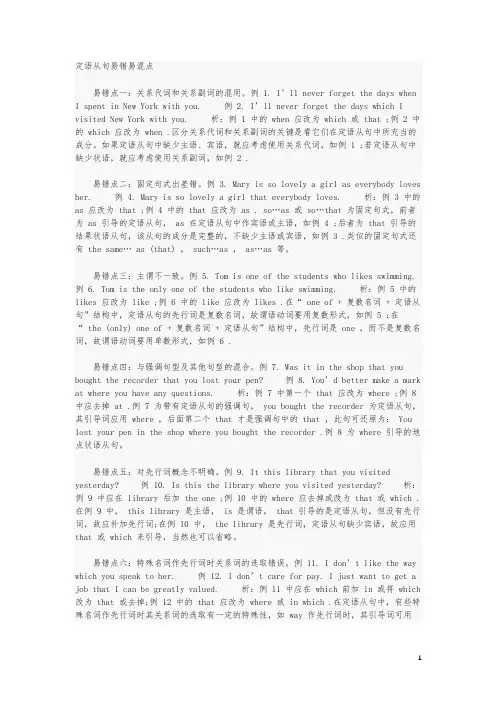
定语从句易错易混点易错点一:关系代词和关系副词的混用。
例 1. I’ll never forget the days when I spent in New York with you. 例 2. I’ll never forget the days which I visited New York with you. 析:例 1 中的 when 应改为 which 或 that ;例 2 中的 which 应改为 when .区分关系代词和关系副词的关键是看它们在定语从句中所充当的成分。
如果定语从句中缺少主语、宾语,就应考虑使用关系代词,如例 1 ;若定语从句中缺少状语,就应考虑使用关系副词,如例 2 .易错点二:固定句式出差错。
例 3. Mary is so lovely a girl as everybody loves her. 例 4. Mary is so lovely a girl that everybody loves. 析:例 3 中的 as 应改为that ;例 4 中的 that 应改为 as . so…as 或 so…that 为固定句式,前者为 as 引导的定语从句, as 在定语从句中作宾语或主语,如例 4 ;后者为 that 引导的结果状语从句,该从句的成分是完整的,不缺少主语或宾语,如例 3 .类似的固定句式还有 the same… as (that) , such…as , as…as 等。
易错点三:主谓不一致。
例 5. Tom is one of the students who likes swimming. 例6. Tom is the only one of the students who like swimming. 析:例 5 中的 likes 应改为 like ;例 6 中的 like 应改为 likes .在“ one of + 复数名词 + 定语从句”结构中,定语从句的先行词是复数名词,故谓语动词要用复数形式,如例 5 ;在“ the (only) one of + 复数名词 + 定语从句”结构中,先行词是 one ,而不是复数名词,故谓语动词要用单数形式,如例 6 .易错点四:与强调句型及其他句型的混合。
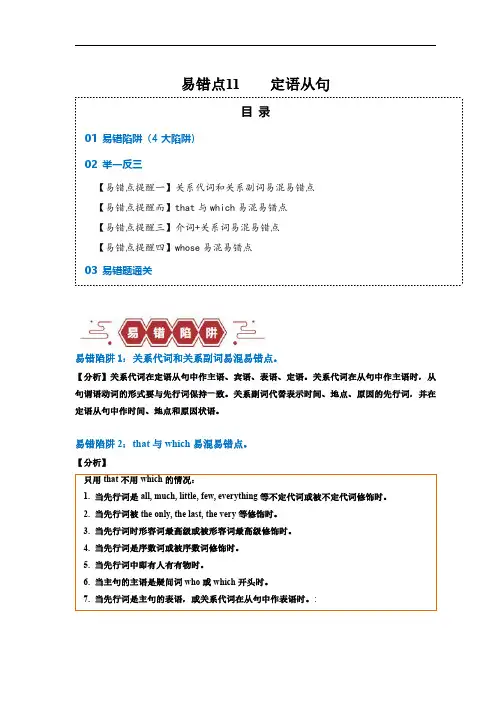
易错点11定语从句目录01易错陷阱(4大陷阱)02举一反三【易错点提醒一】关系代词和关系副词易混易错点【易错点提醒而】that与which易混易错点【易错点提醒三】介词+关系词易混易错点【易错点提醒四】whose易混易错点03易错题通关易错陷阱1:关系代词和关系副词易混易错点。
【分析】关系代词在定语从句中作主语、宾语、表语、定语。
关系代词在从句中作主语时,从句谓语动词的形式要与先行词保持一致。
关系副词代替表示时间、地点、原因的先行词,并在定语从句中作时间、地点和原因状语。
易错陷阱2:that与which易混易错点。
【分析】易错陷阱3:介词+关系词易混易错点。
【分析】1.介词的选择需要根据动词、形容词、介词短语的搭配或者句中所表达的逻辑意思而决定。
2.先行词指人时,关系代词用whom;先行词指物时,关系代词用which;且不可省略。
易错陷阱4:whose易混易错点。
【分析】whose既可以指人,也可以指物,在从句中作定语,修饰名词。
whose+n.=the+n.+of which/whom易错陷阱5:that引导定语从句与同位语从句易混易错点。
【分析】that在定语从句中担任成分,在同位语从句中不做成分。
【易错点提醒一】关系代词和关系副词易混易错点【例1】(2024届浙江省强基联盟高三仿真模拟卷)There is a saying among the archaeological circles in China_________goes,“A page from a book of the Song Dynasty is worth a tael of gold”.【答案】that/which【解析】考查定语从句。
句意:中国考古界有一句俗语,“一页宋版,一两黄金”,指的是这些古籍的重要性和很高的价值。
分析句子可知,空处引导限制性定语从句,修饰先行词saying,先行词指物,在从句中作主语,应用关系代词that或which作引导词。
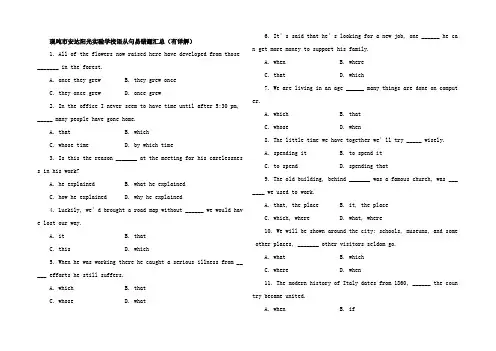
现吨市安达阳光实验学校语从句易错题汇总(有详解)1. All of the flowers now raised here have developed from those _______ in the forest.A. once they grewB. they grew onceC. they once grewD. once grew2. In the office I never seem to have time until after 5:30 pm, _____ many people have gone home.A. thatB. whichC. whose timeD. by which time3. Is this the reason _______ at the meeting for his carelessnes s in his work?A. he explainedB. what he explainedC. how he explainedD. why he explained4. Luckily, we’d broug ht a road map without ______ we would have lost our way.A. itB. thatC. thisD. which5. When he was working there he caught a serious illness from __ ___ efforts he still suffers.A. whichB. thatC. whoseD. what6. It’s said that he’s looking for a new job, one ______ he ca n get more money to support his family.A. whenB. whereC. thatD. which7. We are living in an age ______ many things are done on comput er.A. whichB. thatC. whoseD. when8. The little ti me we have together we’ll try _____ wisely.A. spending itB. to spend itC. to spendD. spending that9. The old building, behind _______ was a famous church, was ___ ____ we used to work.A. that, the placeB. it, the placeC. which, whereD. what, where10. We will be shown around the city: schools, museums, and some other places, _______ other visitors seldom go.A. whatB. whichC. whereD. when11. The modern history of Italy dates from 1860, ______ the coun try became united.A. whenB. ifC. sinceD. until12. All of the flowers now raised here have developed from those _____ in the forest.A. once they grewB. they grew onceC. that once grewD. once grew13. You could see the runners very well from ______ we stood.A. whichB. whereC. thatD. when14. Recently I bought an ancient Chinese vase, _______ was very reasonable.A. which priceB. the price of whichC. its priceD. the price of whose15. What have you got _____ will help a cold?A. whatB. thatC. itD. who16. He was very angry and I can still remember the way _____ he spoke to me.A. howB. thatC. whatD. which17. Do you know the man from ________ house the pictures were st olen?A. whichB. thatC. whatD. whose18. I can think of many cases _______ students obviously knew a lot of English words and expressions but couldn’t write a good essa y.A. whyB. whichC. asD. where19. Is this all that you need? If you married me, I’d give you everything you _____.A. wantB. wantedC. had wantedD. are wanting20. I met the teacher in the street yesterday ________ taught me English three years ago.A. whichB. whenC. whereD. who21. He’s got himself into a dangerous situation _____ he is lik ely to lose control over the plane.A. whereB. whichC. whileD. why22. He made another wonderful discovery, ______ of great importa nce to science.A. which I think isB. which I think it isC. which I think itD. I think is23. Dorothy was always speaking highly of her role in the play, ____, of course, made the others unhappy.A. whoB. whichC. thisD. what24. Their problem today is somewhat similar to _____ they faced many years ago.A. thatB. whichC. that whichD. it25. I saw some trees the leaves of _____ were black with disease.A. thatB. whichC. itD. what26. The famous basketballer, _______ tried to make a comeback, a ttracted a lot of attention.A. whereB. whenC. whichD. who27. When they went into the shop and asked to look at the engage ment rings, the girl brought out a cheaper one, _______ she had arra nged with James.A. the which was whatB. what was thatC. which was whatD. that was that【答案与解析】1. 选 C。

定语从句改错及易错题。
(含答案)B.修改1.This is the XXX.2.This is the watch that Tom is looking for.3.The person whom you spoke to is a student in Grade Two.4.The house in which we live is very small.5.The sun gives off light and warmth。
which makes it possible for plants to grow.6.As we all know。
the 2008 Olympic Games will be held in Beijing.7.His dog。
which was now very old。
became ill and died.8.The reason why he didn't go to school is that he was XXX.9.Those who want to go with me。
please put up your hands.10.The boy。
whose mother died last year。
studies very hard.11.I have two sisters。
both of whom are doctors.12.We're going to visit the school where your brother works.13.Those who have XXX advice.14.I will never et the days when we had a good time together at the sea.1.Anyone who likes it can borrow it from me.2.The man you just saw is my math XXX.3.He is a person who often helps me.4.He is from a very rich family.5.Anyone who breaks the law will be punished.6.(There is no paragraph 6.)7.The students wh o don’t know the answers should ask for help.8.There are many people there。
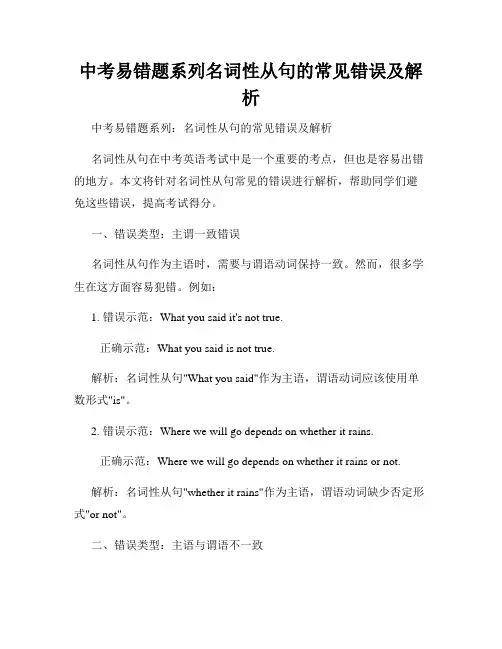
中考易错题系列名词性从句的常见错误及解析中考易错题系列:名词性从句的常见错误及解析名词性从句在中考英语考试中是一个重要的考点,但也是容易出错的地方。
本文将针对名词性从句常见的错误进行解析,帮助同学们避免这些错误,提高考试得分。
一、错误类型:主谓一致错误名词性从句作为主语时,需要与谓语动词保持一致。
然而,很多学生在这方面容易犯错。
例如:1. 错误示范:What you said it's not true.正确示范:What you said is not true.解析:名词性从句"What you said"作为主语,谓语动词应该使用单数形式"is"。
2. 错误示范:Where we will go depends on whether it rains.正确示范:Where we will go depends on whether it rains or not.解析:名词性从句"whether it rains"作为主语,谓语动词缺少否定形式"or not"。
二、错误类型:主语与谓语不一致名词性从句作为主语时,要注意主语与谓语在单复数形式上的搭配。
例如:1. 错误示范:The thing that bothers me is she doesn't like sports.正确示范:The thing that bothers me is that she doesn't like sports.解析:名词性从句"that she doesn't like sports"作为主语,谓语动词应该使用单数形式"bothers"。
2. 错误示范:One of the things that make me happy are my friends.正确示范:One of the things that makes me happy is my friends.解析:名词性从句"that makes me happy"作为主语,谓语动词应该使用单数形式"makes"。
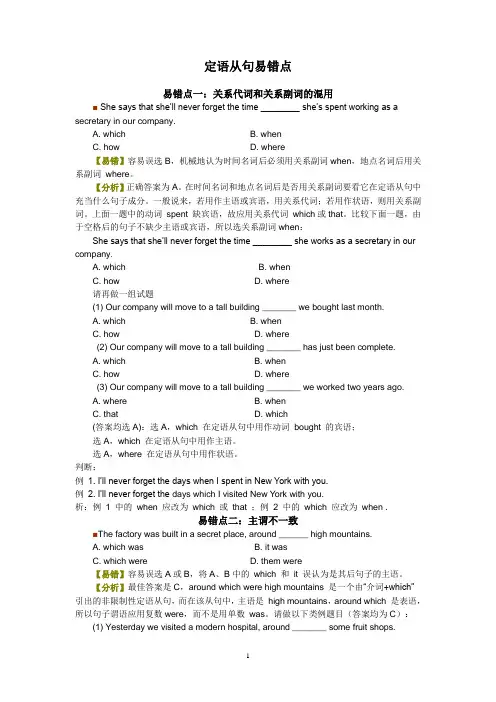
定语从句易错点易错点一:关系代词和关系副词的混用■She says that she’ll never forget the time ________ she’s spent working as a secretary in our company.A. whichB. whenC. howD. where【易错】容易误选B,机械地认为时间名词后必须用关系副词when,地点名词后用关系副词where。
【分析】正确答案为A。
在时间名词和地点名词后是否用关系副词要看它在定语从句中充当什么句子成分。
一般说来,若用作主语或宾语,用关系代词;若用作状语,则用关系副词。
上面一题中的动词spent 缺宾语,故应用关系代词which或that。
比较下面一题,由于空格后的句子不缺少主语或宾语,所以选关系副词when:She says that she’ll never forget the time ________ she works as a secretary in our company.A. whichB. whenC. howD. where请再做一组试题(1) Our company will move to a tall building _______ we bought last month.A. whichB. whenC. howD. where(2) Our company will move to a tall building _______ has just been complete.A. whichB. whenC. howD. where(3) Our company will move to a tall building _______ we worked two years ago.A. whereB. whenC. thatD. which(答案均选A):选A,which 在定语从句中用作动词bought 的宾语;选A,which 在定语从句中用作主语。
![高考英语语法词汇专项突破:04名词性从句易错易混点解读[001]](https://uimg.taocdn.com/76323831571252d380eb6294dd88d0d232d43c66.webp)
高考英语语法词汇专项突破:04名词性从句易错易混点解读名词性从句的主要考点有:名词性从句引导词之间区分;同位语从句与定语从句区分;if引导状语从句与引导名词性从句区分;it在名词性从句中的运用;名词性从句引导词的省略等。
现将它们的易错易混点总结解读如下:【误用1】Can you tell me how many students are there in your school?【指正】are there改为there are。
【解读】考查名词性从句语序。
名词性从句用陈述语序,尤其是在直接引语改为间接引语时,直接引语是问句的时候,改为间接引语实际上就是宾语从句,要用陈述语序。
【典例】Some of them looked at him curiously and wondered what was the matter with him.有几个人古怪地望着他,弄不懂他要干什么。
She told me in detail how they overcame all the difficulties.她具体告知我,他们是怎样克服困难的。
【误用2】(改编自XXXX·湖南·26)You have to know that you're going if you are to plan the best way of getting there.【指正】that改为where。
【解读】考查宾语从句引导词。
及物动词know后是一个宾语从句,从句中谓语动词是不及物动词go,所以不需要宾语,那么就不能用连接代词。
依据go的意思看出应当用作状语的连接副词where才可以表示“去哪里”,与后面的getting there对应。
句意:假如你已经方案好去那里的最佳方案,你必需知道你将要去哪里。
【典例】For example, we can learn where they find water, store food, and obtain their nest-building materials.例如,我们能够了解到它们在哪里找到饮水,贮存食物和得到它们建筑窝巢的材料。
易错点10 并列句和状语从句目录01 易错陷阱(2大陷阱)02 举一反三【易错点提醒一】并列句易混易错点【易错点提醒二】状语从句易混易错点03 易错题通关易错陷阱1:并列句易混易错点。
【分析】1. 逻辑关系和句式结构判断法;2. 连词词义需牢记。
【高考链接】1.(2023年新高考I卷)To eat one, you have to decide whether to bite a small hole in it first, releasing the stream and risking a spill (溢出), ________ to put the whole dumpling in your mouth, letting the hot soup explode on your tongue.【答案】or【详解】考查连词。
句意:吃小笼包的时候,你必须要决定是先咬一个小口流出汤汁,还是把整个小笼包放进嘴里,让热汤在舌头上爆炸。
whether...or... “是……还是……”,固定搭配,根据句意,故填or。
【规律总结】示原因的从属连词because连用。
“或者”为表示选择关系的连词,or还可译为“否则”,可用于句型:“祈使句+or+陈述句”。
both... and..., neither... nor..., not only...but also..., either...or..., not...but...特殊搭配解题。
作并列连词。
when表示“在那时,突然”;while表示“然而,而”,表对比或转折关系。
并列连词when常用于以下句型中:...was/were doing ...when ……正在做……突然……...was/were about to do ...when ... ……刚要做……突然……...was/were on the point of doing ...when ... ……刚要做……突然……...had just done ...when ... ……刚/一……就……I had just finished my homework when Tom came to me.我刚写完作业,Tom就来找我了。
易混易错定语从句10例关于定语从句,对于一些英语研究者来说,可能会有很多混淆和错误。
下面让我们来看看一些关于定语从句混淆和错误的例子。
第一,定语从句不能用简单的连词“and”连接,而应使用“that”或“which”:错:The professor and teaches us English is from England.正:The professor that teaches us English is from England.第二,定语从句应使用定冠词“the”:错:This is a book, has a lot of pictures.正:This is the book that has a lot of pictures.第三,定语从句应使用主语从句:错:The girl, she is very friendly.正:The girl who is very friendly.第四,定语从句不能使用“who”:错:The people who live in this city are friendly.正:The people that live in this city are friendly.第五,定语从句应使用形容词从句:错:The house, it is very big.正:The house which is very big.第六,定语从句不能使用“that”:错:This is the man that works in the bank.正:This is the man who works in the bank.第七,定语从句不能使用“which”:错:This is the girl which is my friend.正:This is the girl who is my friend.第八,定语从句应使用宾语从句:错:She told me that I should study harder.正:She told me that I should study harder.第九,定语从句不能使用“where”:错:This is the place where I live.正:This is the place that I live.第十,定语从句应使用时间从句:错:This is the day, it is my birthday.正:This is the day when it is my birthday.以上是一些关于定语从句混淆和错误的例子。
易混易错选择题100例1. ①Study hard , ________ you’ll succeed.②Study hard, ________ you’ll fail.A. unlessB. orC. butD. and2. ①He lived in the city of Beijing ________ there’s a Zhongguan cun.②He lived in the city of Beijing and ________ there’s a Zhongguan cun .A. in thatB. in itC. whereD. wherever3.①It was nine o’clock ________ we got to the station.②It was at nine o’clock ________ we got to the station.③It is nine hours _______ we got to the station.④It will be nine hours _______ we get to the station.A. sinceB. thatC. whenD. before4. ①________ he said so made us very happy.②________ he said made us very happy.A. WhichB. WhatC. ThatD. it5. ①Is this bike ________ she lost the day before yesterday?②Is this the bike ________ she lost the day before yesterday?A. thatB. whatC. the oneD. it6. ①________ is well known, Hong Kong has been returned to our motherland.②________ is well known that Hong Kong has been returned to our motherland.③Hong Kong has been returned to our motherland, ______ is well known.④_______ Hong Kong has been returned to our motherland is well known.A. WhichB. AsC. ItD. That7. ①He must have lived here for 10 years, ________ he?②He must have finished the work yesterday, ________ he ?A. mustn’tB. haven’tC. didn’tD. hasn’t8. ①There ________ no buses, we had to walk home.②There ________ no buses, so we had to walk home.A. isB. wereC. areD. being9. ①We young people should go ________ we are most needed.②We young people should go to ________ we are most needed.A. the place whichB. whereC. the place whereD. which10.①He is one of the students who ________ good at drawing.②He is the one of the students who ________ good at drawing.A. isB. doesC. areD. do11. ①The book is worth ________, I think.②The book is worthy of ________, I think.③The book is worthy ________, I think.A. to readB. being readC. readingD. to be read12.①The little girl had no choice but ________ at home.②The little girl could do nothing but ________ at home.③The little girl could not (help) but _______ at home.A. to stayB. to stayingC. stayedD. stay13.①New York is much larger than ________ in America.②New York is much larger than ________ in India.A. other cityB. any cityC. all citiesD. any other city14.①Many students find ________ difficult to learn.②Many students find ________ language difficult to learn.A. EnglishB. an EnglishC. the EnglishD. England15.①We will never forget the days ________ we spent together.②We will never forget the days ________ we worked together.A. thatB. whereC. on whichD. when16.①Tom got the first place, ________ made his parents happy.②Tom got the first place, and ________ made his parents happy.A. asB. whichC. thatD. this17.①He needs ________ on.②The doctor needs ________ on him.A. to operateB. being operatedC. operateD. to be operated18.①He is unfit for the job, ________?②He isn’t fit for the job, ________?A. isn’t heB. is heC. doesn’t heD. dose he19.①Let’s go at once, ________?②Let us go at once, ________?A. will youB. shall weC. do youD. does he20.①Our teacher entered the classroom, ________.②Our teacher entered the classroom, with ________.A. a book in handB. book in handC. a book in his handD. book in21.①________ many times, so he could understand it.②________ many times, he couldn’t understand it.A. Having been toldB. Having toldC. He had been toldD. Though he had been told22.①The writer and scientist ________ present at the meeting.②The writer and the scientist ________ present at the meeting.A. wereB. wasC. hasD. had23.①Three years later he turned ________ doctor.②Three years later he became ________ doctor.A. anB. aC. 不填D. the24.①My brother often plays ________ football after school.②My brother often plays ________ piano after school.A. 不填B. aC. theD. an25.①She is ________ good a teacher that we all like her.②She is ________ good teacher that we all like her.A. soB. suchC. such aD. quite a26. ①She often goes to school ________ bike.②She often goes to school ________ foot.③She often goes to school ________ her bike.A. inB. atC. onD. by27.①More than 70 percent of the population of these country ________ peasants.②More than 70 percent of the population of this country ________ farming-population.A. hasB. haveC. isD. are28. ①He as well as his brother ________ football now.②He and his brother ________ football now.A. is playingB. is playedC. are playingD. are played29.①All of the apples ________ rotten.②All of the apple ________ rotten.A. areB. isC. have beenD. has been30.①Do you know ________ John is getting on well with his studies?②Do you know ________ John is getting on with his studies?A. howB. whichC. whatD. that31.①The workers ________ a new hospital since the end of last year.②The workers ________ a new hospital by the end of last year.A. have builtB. have been buildingC. had builtD. were building32.①It is 3 years ________ his brother joined the army.②It is 3 years ago ________ his brother joined the army.A. sinceB. thatC. afterD. before33.①They don’t know ________ he will come unless told.②They don’t know ________ he will come until told.A. thatB. whetherC. how longD. if or not34.①I ________ 10 dollars on the dictionary.②I ________ 10 dollars for the dictionary.A. tookB. costC. paidD. spent35.①He has two watches, but ________ of them works well.②He has two watches, and ________ of them work well.A. bothB. noneC. neitherD. either36.①——Who did you see in the room?——________.②——How many people did you see in the room?——________.A. No oneB. NoneC. AnyoneD. Any one37.①You ________ be a bit tired. Why not stop to rest?②You ________ be so tired that you had to stop to rest.A. shouldB. can’tC. mustD. mustn’t38.①Jenny ________ have kept her word. I wonder why she changed her mind.②Jenny ________ have kept her word, I wonder why she didn’t change her mind.A. mustB. shouldC. needD. would39.①This is the reason ________ you all know.②I really don’t know the reason ________ Professor Li didn’t attend the meeting.A. whyB. whichC. becauseD. that40. ①He asked us the question ________ the film was worth seeing.②He made the suggestion ________ the meeting should be put off.A. whenB. whereC. thatD. whether41.①He is working hard, ________ every one of us can see.②He passed the exam, ________ pleased every one of us.A. asB. itC. thatD. which42.①________ studies hard will make greater progress.②________ will come to finish this task hasn’t been decided yet.A. WhoB. WhoeverC. WhateverD. No matter who43.①I’m sure________ he finished the task on time yesterday.②I’m not sure________ he will finish the task on time.A. whetherB. whichC. ifD. that44. ①Is this park________ he visited the other day?②Is this the park________ he visited the other day?A. in whichB. the oneC. 不填D. where45.①She didn’t leave the classroom________ she had finished the homework.②She got to the station________ the bus left.A. tillB. sinceC. whileD. before46. ①It won’t be long________ we meet again.②We’ll meet again _______ long.③He came soon________ we had watered the garden.A. tillB. sinceC. afterD. before47. ①________ hard it may be, I will carry it out.②________ great progress I have made, there is still a long way to go.A. HowB. HoweverC. WhateverD. What48.①The reason________ he couldn’t come was that his mother was ill.②It was________ his mother was ill that he couldn’t come.A. asB. becauseC. sinceD. why49. ①Mary used to have________ with her husband.②Mary is asking for you. Maybe she will have________ with you.A. some wordsB. wordsC. the wordD. a word50.①Her composition is well written________ some spelling mistakes.②Her composition is well written________ she made some spelling mistakes.③She goes to school every day________ on Sundays.④She often goes to school on foot _______ it rains.⑤I have looked for her everywhere _______ the library.⑥I have looked for her everywhere _______ she stayed yesterday.A. exceptB. except whenC. except thatD. except forE. except whereF. except in51.①________ from the top of a twenty-storied building, Wuhan looks very beautiful.②________ these pictures, he couldn’t help thinking of those days when he was in Wuhan.A. SeeingB. To seeC. SeenD. Saw52.①The question________ at the meeting yesterday is very important.②The question________ now at the meeting is very important.A. discussingB. discussedC. being discussedD. to be discussed53.①Our teacher tried to speak louder in order to made us________.②Our teacher tried to speak louder in order to made herself________.A. to hearB. hearingC. heardD. hear54.①—You have bought a new car.—________.②—Mary has bought a new car.—________.A. So did IB. So I haveC. So I didD. So have I55. ①Time________,he shall go outing.②If time________,he shall go outing.A. permittedB. permitsC. permittingD. would permit56.①She has many novels, some of________ are interesting.②She has many novels, and some of ________ are interesting.A. thatB. whichC. itD. them57.①________ many times, he has already known how to do it.②________ many times, but he still didn’t know how to do it.A. Having been toldB. He had been toldC. Though he had been toldD. Having told58.①It was the first class________ Miss Li taught us ________ we never forget.②It was the first class________ Miss Li taught us ________ we never forget it.A. that;thatB. that;andC. which;thatD. that;which59.①________ this road and you’ll get to the cinema.②________ this road, you’ll get to the cinema.A. To followB. FollowC. If followingD. Following after60.①She________ early before she came here.②She________ early since she came here.A. used to get upB. has used to get upC. has got used to getting upD. was used to getting up.61.①I can’t help________ the work for her because she’s too young to do it.②I can’t help but________ the work for her because she’s too young to do it.③I can’t help _______ the work because I am busy now.A. doB. didC. doingD. to doing62.①I forgot________ her the book. I’ll go back to take it.②I forgot________ her the book, so I went back to take it again.A. to returnB. returningC. to return backD. return63.①He had the sick girl________ to the hospital.②He had the sick girl________ medicine to the hospital.③He had the sick girl________ medicine to the hospital to and fro.A. carryB. to carryC. carryingD. carried64.①She _____ not have translated the book. Her English isn’t that good.②Sometimes he is reluctant to help others, so he ______ not lend you the book you need.③He ____ be at home. I can hear his voice.④She ______ talk for hours if you give her the chance.⑤Yes, she is a bit mean, but she ______ lend you her camera.A. canB. mayC. mustD. will65.①We had thought what we did________ him.②We had thought that we did ________ him.A. satisfyingB. satisfactionC. satisfiedD. satisfy66.①She is considered________ the dance hall sometime early.②She has considered________ the dance hall so far.A. how to buyingB. to buyC. to have boughtD. buying67.①________ in the magazine, I made a decision to read it again.②________ by the magazine, I made a decision to read it.A. InterestB. InterestedC. To interestD. Being interested68.①What________ me most was that nobody was on duty.②What was most________ to me was that no-body was on duty.A. to surpriseB. surprisingC. surprisedD. in surprise69.①Would you like________ to the film this evening?②Do you feel like________ to the film this evening?A. goingB. to goC. goD. gone70.①There were 12 persons in the bus, ________ a baby.②There were 12 persons in the bus, a baby ________.A. to includeB. includingC. includedD. to contain71.①He was too busy________ his friend.②He was very busy________ his friend.③He was too busy _______ his work ______ his friend.A. in acceptingB. withC. to receiveD. receiving72.①________, he could lift the heavy stone②________, he could not lift the heavy stone.A. Strong as he wasB. So strong as was heC. He was strong enoughD. As he was strong73.①________, we had to go home on foot yesterday.②________, so we had to go home on foot yesterday.A. There being no busesB. Because there being no busesC. There were no busesD. Without any buses74.①________ he said at the meeting surprised us all.②________ he said nothing at the meeting surprised us all.A. WhatB. WhichC. ThatD. Whether75.①________ we’ll have a meeting tomorrow has been decided.②________ we’ll have a meeting tomorrow has not been decided.A. ThatB. IfC. WhetherD. what76.①Our teacher did________ he could to help us.②Our teacher did all________ he could to help us.A. whatB. whichC. thatD. whom77.①The old man entered the room, ________ by his son.②The old man entered the room, ________ his son.A. followB. to followC. followedD. following78.①The little boy would like________ her to the cinema.②The little boy would like________ to the cinema.A. to takeB. takingC. to be takenD. being taken79.①It was in the house________ I saw that young man.②It was the house________ I saw the young man.A. whichB. whatC. thatD. where80.①This is the factory________ I worked two years ago.②This is the factory________ I visited two years ago.A. thatB. whereC. at thatD. what81.①My mother went home, and________ the door open.②My mother went home, ________ the door open.A. to findB. foundC. findingD. find82.①My mother didn’t come back on April 25, ________ was my birthday.②My mother didn’t come back on April 25, ________ was a pity.A. thatB. whichC. whenD. as83.①Could you tell me________ to do it tomorrow?②Could you tell me________ to do tomorrow?A. whenB. howC. whatD. that84.①These professors________ already to the party are from England.②These professors________ tomorrow to the party are from England.A. being invitedB. having been invitedC. invitedD. to be invited85.①I’m sorry________ you so much trouble.②I’m sorry for________ you so much trouble.A. having givenB. to have been givenC. to have givenD. having been given86.①Mary will________ sure to go there tomorrow.②Mary________ sure to go there tomorrow.A. areB. beC. isD. does87.①You________ wait until your father ________ back.②You ________ leave until you father ________ back.A. should…comesB. shouldn’t…will comeC. shouldn’t…comesD. should…will come88.①I think he must be a good student, ________?②She thinks he must be a good student, ________?A. mustn’t heB. doesn’t sheC. don’t theyD. isn’t he89.①Mr. Brown with his friends ________ of collecting stamps.②Mr. Brown and his friends________ of collecting stamps.A. is fondB. are fondC. fondD. fonds90.①Father promised________ I studied harder he would take me to Beijing next summer.②Father promised________ he would take me to Beijing next summer if I studied harder.A. thatB. ifC. that ifD. if that91.①________ makes me feel sad seeing you living all alone.②________ makes me feel sad is seeing you living all alone.A. ThatB. ThisC. ItD. What92.①________ he come, what________ you say to him?②________ he comes, what________ you say to him?A. Should…wouldB. When…wouldC. If…willD. Were to…do93.①There is something wrong with my watch. ________ needs repairing.②There is something wrong with my watch, ________ needs repairing.A. ItB. WhichC. whichD. that94.①Seeing is________.②To see is________.A. believingB. believeC. to believeD. belief95.①—Do you need a pen? —Yes, I need________.②I bought a pen yesterday. I like ________ very muck.A. thisB. itC. thatD. one96.①________ Japan lies east of China is known to all.②I don’t know ________ has happened to him now.A. IfB. WhatC. ThatD. Where97.①It takes a lot of________ to build a house.②A new chemical ________ will be set up soon.A. workingB. worksC. workD. job98.①We have been working for five hours, but we are not ______ tired.②We have been working for five hours, and we are not ______ tired.A. a bitB. a fewC. littleD. a little99.①________ come if you have time.②He________ do it the other day.A. DoB. DosC. didD. Have100.①The building ________ last year is a new school.②The building ________ next year is a new library.A. buildingB. builtC. to be builtD. being built 101.①I need to have my watch ______.②I need to have someone _______ the watch for me.A. fixB. to fixC. fixingD. fixed102.①______ he doesn’t keep his promise?②I wonder what we should do ______ he said was true.A. What/what ifB. If/ifC. If/if whatD. What/what that 103. If only/ only if①out of question②out of the question【参考答案】1.DB2.CB3.CBAD4.CB5.CA6.BC(A/B)D7.DC8.DB9.BC 10.CA 11.CBD 12.ADD 13.DB 14.AC 15.AD 16.BD 17.DA 18.AB 19.BA 20.BC 21.CD/A 22.BA 23.CB 24.AC 25.AC 26.DCC 27.DC 28.AC 29.AB 30.DA 31.BC 32.AB 33.BA 34.DC 35.CA 36.AB 37.CB 38.BA 39.DA 40.DC 41.AD 42.BA 43.DA 44.BC 45.AD 46.DDC 47.BC 48.DB 49.BD 50.DA 51.DCABFE 52.BC 53.DC 54.BD 55.CB 56.BD 57.AB 58.AB 59.BC 60.AC 61.CAA 62.AB 63.DAC 64.ABCDB 65.CD 66.CD 67.DB 68.CB 69.BA 70.BC 71.CDBC 72.DA 73.AC 74.AC 75.AC 76.AC 77.CD 78.AC 79.CD 80.BA 81.BC 82.BB 83.BC 84.CD 85.CA 86.BC 87.AC 88.DB 89.AB 90.CA 91.CD 92.AC 93.AC 94.AC 95.DB 96.CB 97.CB 98.AD 99.AC 100.BC 101.DA 102. AC。
易错点12名词性从句目录01易错陷阱(4大陷阱)02举一反三【易错点提醒一】主语从句连接词what/that/whether/if易混易错点【易错点提醒二】宾语从句引导词及介词后接宾语从句易混易错点【易错点提醒三】表语从句引导词及三个句式易混易错点【易错点提醒四】同位语从句与定语从句易混易错点03易错题通关易错陷阱1:主语从句连接词what/that/whether/if易混易错点。
【分析】1.that引导主语从句时,无词义,只起连接作用,一般不能省略。
what在从句中作主语、宾语、表语和定语。
2.whether引导的主语从句可放在句首,if引导主语从句在句尾,且用it作形式主语。
3.It作形式主语,that引导真正的主语从句。
4.What引导主语从句时,谓语动词一般用复数形式,若表语是复数,则谓语用复数。
易错陷阱2:宾语从句引导词及介词后接宾语从句易混易错点。
【分析】1.doubt用于肯定句时,宾语从句用whether,doubt用于否定句时,宾语从句用that 引导。
2.介词后跟宾语从句时只能用wh-类连接词引导;如:I’m surprised at what he said.3.介词后如果跟that从句,要先加it作形式宾语,再加that从句。
如:depend on it that...;rely on it that...;see to it that...等。
4.宾语从句的时态:主句是现在时或将来时,从句用句意的各种时态。
主句是过去时,从句用相应的过去时态。
从句表示客观事实或真理,从句都用现在时。
易错陷阱3:表语从句引导词及三个句式易混易错点。
【分析】1.as if/as though引导时,从句可用陈述语气,也可以用虚拟语气。
2.That is why+结果,表示“那就是.....的原因”。
3.That is because+原因,表示“那是因为......”。
4.The reason why/for...is that...,表示“......的原因是......”。
名词性从句与定语从句易错题汇总练习名词性从句和定语从句是英语语法中的两个重要概念。
它们都属于从句的范畴,但在用法和功能上有一些区别。
下面我们来练习一些常见的易错题,加深对名词性从句和定语从句的理解。
1. 名词性从句练习题1.1 选择正确的答案填空。
(1) 请告诉我你知道这个消息的原因是 ____ ?A. 什么B. 为什么C. 怎么样D. 多少(2) 那个小女孩不知道她应该去哪里,她问我 ____ 去?A. 去哪里B. 怎么去C. 为什么去D. 什么去(3) 你是否知道他什么时候回来?A. 为什么B. 什么时候C. 怎么D. 是否(4) 她说她没有想到他会来参加我的生日派对,这让我非常____ 。
A. 开心B. 生气C. 惊讶D. 担心1.2 将下列句子改写成名词性从句形式。
(1) 我不知道她是谁。
(2) 他不知道他应该怎么办。
(3) 你知道他们什么时候会到达吗?(4) 我相信他会做出正确的决定。
2. 定语从句练习题2.1 选择正确的答案填空。
(1) 我昨天遇到了那个你曾经提到过的人, ____ 谁来买地图的。
A. 并且B. 也就是C. 也是D. 即使(2) 那本书是昨天借给我的, ____ 书上的名字是叫《Harry Potter》。
A. 然后B. 那么C. 而且D. 可是(3) 这是我唯一一个不喜欢的颜色, ____ 让我感到不舒服。
A. 因为B. 即使C. 所以D. 不管(4) 我在那家咖啡店里见到的人, ____ 来自法国。
A. 然而B. 正是C. 虽然D. 是因为2.2 将下列句子改写成定语从句形式。
(1) 我看见了一个买书的人。
(2) 这是我喜欢的歌曲。
(3) 那位教授正在和我的哥哥交谈。
(4) 她做的饭真好吃。
以上是对名词性从句和定语从句的一些基础练习题,希望能够帮助你更好地掌握它们的用法。
请在答题结束后核对答案,如果有错误,请重复阅读相关知识点并进行适当的修改。
八年级英语同位语从句易错点练习题40题含答案解析1.The news that our school will hold a sports meeting next week makes us excited.A.newsB.thatC.our schoolD.next week答案解析:B。
“that our school will hold a sports meeting next week”是同位语从句,解释说明“news”的具体内容。
选项A“news”是先行词;选项C“our school”是同位语从句中的主语;选项D“next week”是同位语从句中的时间状语。
只有选项B“that”是引导同位语从句的连接词。
2.The idea that we should help each other is very good.A.ideaB.thatC.weD.each other答案解析:B。
“that we should help each other”是同位语从句,解释说明“idea”的内容。
选项A“idea”是先行词;选项C“we”是同位语从句中的主语;选项D“each other”是同位语从句中的宾语。
只有选项B“that”是引导同位语从句的连接词。
3.The fact that he has passed the exam makes his parents proud.A.factB.thatC.heD.passed答案解析:B。
“that he has passed the exam”是同位语从句,说明“fact”的具体情况。
选项A“fact”是先行词;选项C“he”是同位语从句中的主语;选项D“passed”是同位语从句中的谓语动词。
只有选项B“that”是引导同位语从句的连接词。
4.The hope that I can become a doctor one day is strong.A.hopeB.thatC.ID.become答案解析:B。
从句易混易错题定语从句①He is one of the stude nts who ____ good at draw ing.②He is the only one of the stude nts who ____ good at draw ing.A. isB. doesC. areD. do①He lived in the city of Beiji ng ___ there's a theme park.②He lived in the city of Bei ji ng and ___ there's a theme park .A. in thatB. in itC. whereD. wherever①We you ng people should go ___ we're most n eeded.②We you ng people should go to ___ we're most n eeded.A. the place whichB. whereC. the place whereD. which①Is this bike _____ she lost the day before yesterday②Is this the bike ____ she lost the day before yesterdayA. thatB. whatC. the oneD. it①_____ is well known, Hong Kong has bee n retur ned to our motherla nd.② ____ is well known that Hong K ong has bee n retur ned to our motherla nd.A. WhichB. AsC. ItD. That①We will n ever forget the days _____ we spe nt together.②We will n ever forget the days ______ we worked together.A. thatB. whereC. on whichD. whe n①Tom got the first pla ce, ______ made his pare nts happy.②Tom got the first place, and ____ made his pare nts happy.A. asB. whichC. thatD. these①This is the reason ____ you all know.②I really don't know the reas on __ Professor Li did n't atte nd the meeti ng.A. whyB. whichC. becauseD. that①He is work ing hard, __ every one of us can see.②He passed the exam, ____ pleased every one of us.A. asB. itC. thatD. which①Is this park ______ he visited the other day?②Is this the park ___ he visited t he other day?A. in whichB. the oneC.不填D. where①She did n't leave the classroom ___ she had finished the homework.②She got to the stati on ____ the bus left.A. tillB. sinceC. whileD. before①The reason ____ he could n't come was that his mother was ill.②It was ___ h is mother was ill that he could n't come.A. asB. becauseC. sinceD. why①She has many no vels, some of ______ are in teresti ng.②She has many no vels, and some of _____ are in teresti ng.A. thatB. whichC. itD. them①It was in the house ___ I saw that you ng man.②It was the house _____ I saw the you ng man.A. whichB. whatC. thatD. where①This is the factory ____ I worked two years ago.②This is the factory ____ I visited two years ago.A. thatB. whereC. at thatD. what①My mother did n't come back on April 25, ___ was my birthday.②My mother did n't come back on April 25, and ___ was a pity.A. thatB. whichC. whe nD. it①There is somethi ng wrong with my watch. __ n eeds repair ing.②There is somethi ng wrong with my watch, ____ n eeds repair ing.A. ItB. WhichC. whichD. that①_____ he said so made us very happy.②_____ he said made us very happy.A. WhichB. WhatC. ThatD. it①Do you think ___ Joh n is gett ing on well with his studies② ____ do you thi nk Joh n is gett ing on with his studiesA. howB. whichC. whatD. that①They don't know ____ he will come uni ess told.②They don't know ____ he will come un til told.A. thatB. whetherC. how longD. if or not①He asked us the questi on ____ t he film was worth see ing.②He made the suggesti on ___ the meet ing should be put off.A. whe nB. whereC. thatD. whether①_____ studies hard will make greater progress.② ___ w ill come to finish this task has n't bee n decided yet.A. WhoB. WhoeverC. WhateverD. No matter who①I'm sure _____ h e fini shed the task on time yesterday.②I'm not sure _____he will finish the task on time.A. whetherB. whichC. ifD. that①_____ he said at the meeting surprised us all.② ___ he said nothing at the meet ing surprised us all.A. WhatB. WhichC. ThatD. Whether①_____ we'll have a meeti ng tomorrow has bee n decided.② ___ we'll have a meet ing tomorrow has not bee n decided.A. ThatB. IfC. WhetherD. what①Our teacher did _____ he could to help us.②Our teacher did all ____ he could to help us.A. whatB. whichC. thatD. whom①Father promised ____ I studied harder he would take me to Beijing next summer.②Fat her promised____ he would take me to Beijing next summer if I studied harder.A. thatB. ifC. that ifD. if that①_____ makes me feel sad see ing you livi ng all alone.② ___ makes me feel sad is see ing you liv ing all alone.A. ThatB. ThisC. It D. What①Japa n lies east of China is known to all.② I don't know has happe ned to him now.A. ifB. whatC. that D. where状语从句① There no buses, we had to walk home. ② There no buses, so we had to walk homeA. isB. wereC. are D. bei ng① Study hard , you'll succeed.② Study hard, you'll fail.A. unl essB. orC. but D and①She is ____ good a teacher that we all like her .②She is ____ good teacher that we all like her.A. soB. suchC. such aD. quite a①It is 3 years _____his brother joined the army.②It is 3 years ago ____ his brother joined the army.③It'll be 3 years ____ he comes backA. si neeB. thatC. afterD. before①It won't be long _____ we meet aga in.②He came so on _____ we had watered the garden.A. tillB. si neeC. afterD. before①____ hard it may be, I will carry it out.② ___ great progress I have made, there is still a long way to go.A. HowB. HoweverC. WhateverD. What①____ , he could lift the heavy stone② ___ , he could not lift the heavy stone.A. Strong as he wasB. So strong as was heC. He was strong enoughD. As he was stro ng①____ , we had to go home on foot yesterday.② ___ , so we had to go home on foot yesterday.A. There being no busesB. Because there being no busesC. There were no busesD. Without any buses①_____ he come, what ____ you say to him ② _____ he comes, what _____ you say to himA. Should …wouldB. When…wouldC. If …willD. Were to …do。